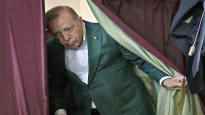Turkey’s opposition will not be resolved without negotiations. Prolonging them would be a problem for all parties.
20.5. 15:14 • Updated May 20th. 15:40
President of Turkey Recep Tayyip Erdoğan has repeatedly stated its opposition to Finland’s and Sweden’s NATO membership.
Last Sunday, Turkey presented a list of demands that Finland and Sweden should end their support for terrorist organizations, provide security guarantees and lift export bans on the country.
In this story, we will go through what Turkey wants and how its objectives can be met.
Turkey is demanding that Finland return the Kurds, whom it considers to be terrorists
Finland cannot return people to a country where they are in danger of being imprisoned and tortured.
Turkey has demanded that Finland and Sweden extradite 33 people who it believes have links to terrorism. Turkey’s perception of terrorism is broad, and it has also branded non-violent Kurdish independenceists or those opposed to President Recep Tayyip Erdoğan as terrorists. Finland and Sweden cannot return anyone to Turkey without legal proceedings.
Turkey is demanding that Finland and other NATO countries export arms
An arms export license is a political decision that countries can make if they so wish.
In principle, Turkey can block Finland’s NATO membership, but it hardly makes sense for it
All current NATO countries must accept new members, and Turkey can therefore block the membership of Finland and Sweden. However, the act could ruin Turkey’s relations with the West.
Leading NATO country The United States welcomes Finland’s and Sweden’s NATO membership. Turkey’s resistance could further worsen its inflamed divisions with the United States and jeopardize relations with other Western countries. In practice, the United States and other NATO countries can put pressure on Turkey and push it already into a tight economy.
Turkey cannot be separated from NATO, even if its head does not turn
NATO has never been separated from a member state and is not even possible.
NATO does not have a mechanism for separating a member state. However, Turkey’s position in NATO can be made difficult by isolating it from joint action. Turkey could also withdraw from NATO itself if it so wishes.
Turkey’s resistance will not pass by waiting
Resolving the situation requires negotiations and compromises. Prolonging it can be difficult for all parties.
Due to the war in Ukraine and the unpredictability of Russia, Finland and Sweden are under pressure to join NATO quickly. However, prolonging the situation is also not in the interests of Turkey or its President Erdoğan. Economic sanctions would hurt ordinary Turks and make it difficult to re-elect the president in the upcoming elections.
Turkey opposes NATO enlargement to put pressure on the United States
Turkey sees NATO membership talks as an opportunity to demand that the United States stop arming the army in the Syrian Kurdish Autonomous Region.
The United States is arming the army of the Kurdish Syrian Autonomous Region, the YPG, which has been an ally of the country in the fight against the jihadist organization Isis. Turkey considers the YPG to be a terrorist organization and perceives it as a security threat. Turkey has demanded that the United States stop arming the YPG.
The possibilities for Finland and Sweden to influence the conflict between the United States and Turkey are non-existent.
Relations between Turkey and the United States are also being eroded by their mutual arms trade, which stalled after Turkey bought Russian missile systems. Despite its efforts, Turkey has not been able to buy the fighters it wants from the United States.
The representative of the Finnish Middle East Institute Foundation has been interviewed for the story Anu from Leino and a senior researcher at the Foreign Policy Institute Toni Alarantaa. Background information was provided by ‘s foreign journalist Tom Kankkonen.
You can discuss the topic on 21.5. until 11 p.m.
